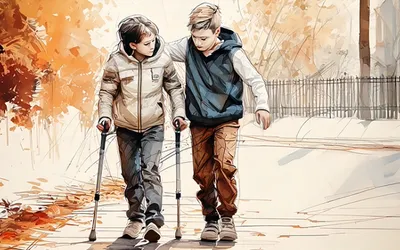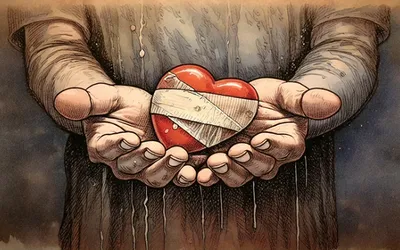This fallen world is full of many fearful things: cancer, earthquakes, accidents, tornadoes, poverty, famines, sickness, and numerous other troubles that befall mankind. One of the scariest things in this life, perhaps the scariest, is other people. Abuse from parents, infidelity of spouses, rebellion of children, betrayal of friends, hatred of enemies—these pains are deep and scarring when they occur.
Considering these things, it is not unreasonable, naturally speaking, to live our lives in perpetual fear and guardedness. And there is no use in trying to convince yourself not to fear because there is nothing to fear. Experience will teach you very quickly that there is plenty to be fearful of where people are concerned.
It is not because our fears are irrational that followers of Jesus Christ are not to live in fear; rather, it is because of who God is for us that we need not be afraid. David expresses this reality in the opening verse of Psalm 27, saying:
The Lord is my light and my salvation—whom shall I fear? The Lord is the stronghold of my life—of whom shall I be afraid? (v.1)
Despite the very real threat that people pose to us in various ways, we need not fear them because God is our light in the darkness of hate and hurt. God is our salvation, the One who rescues us from those who would harm us. God, our Father, is the stronghold, the fortress we flee to and are kept safe.
If God is the One who saves us and He is the One who guards us like a fortress, of whom should we be afraid? Who can damage us in any real way? Who can wound us in such a way that the Great Physician cannot heal us? In Him, we are set free from fear. In Him, we are safe to love.
People may still try their best to hurt us at times, but in the safety of God's presence, we can remain fearless and confident, as David goes on to say:
When the wicked advance against me to devour me, it is my enemies and my foes who will stumble and fall. Though an army besiege me, my heart will not fear; though war break out against me, even then I will be confident. (vv.2-3)
With our heavenly Father at our side, we have a greater hope than just wishing that the worst not happen. Yes, we have the greater hope that even if the worst happens, even if people try to harm us, God will be our protection. This is true freedom from self-protection.
So, what do we do in times of fearful trouble? David had only one request:
One thing I ask from the Lord, this only do I seek: that I may dwell in the house of the Lord all the days of my life, to gaze on the beauty of the Lord and to seek him in his temple. (v.4)
Now, this "one thing" is often taken out of its context, but David speaks about this desire in the midst of a "day of trouble":
For in the day of trouble he will keep me safe in his dwelling; he will hide me in the shelter of his sacred tent and set me high upon a rock. Then my head will be exalted above the enemies who surround me; at his sacred tent I will sacrifice with shouts of joy; I will sing and make music to the Lord. (vv.5-6)
We are set free to hide in our Father's house, enjoying fellowship with Him in Jesus and worshipfully gazing upon His glorious beauty while the trouble passes by. We need not defend ourselves, for while safe in our Father's house, He will shelter us from the storm.
This beautiful promise is hard for us to believe. There are many reasons for this. One, the reality we are speaking about is spiritual and invisible to our natural eyes. David confronts this fear in himself by simply bringing it to the Lord, asking Him not to turn from him or reject him.
Hear my voice when I call, Lord; be merciful to me and answer me. My heart says of you, “Seek his face!” Your face, Lord, I will seek. Do not hide your face from me, do not turn your servant away in anger; you have been my helper. Do not reject me or forsake me, God my Savior. (vv.7-9)
Secondly, the unfaithfulness of even the nearest and dearest people in our lives makes it frightening to wholeheartedly trust in our heavenly Father. Yet David sees in the Lord one who is even more faithful than our closest family and puts his trust in Him:
Though my father and mother forsake me, the Lord will receive me. (v.10)
Finally, the utter hate, oppression and slander of foes can so quickly shake our confidence and tempt us to turn to self-protection. David, however, resists this temptation and asks the Lord to teach and guide him through the dangers:
Teach me your way, Lord; lead me in a straight path because of my oppressors. Do not turn me over to the desire of my foes, for false witnesses rise up against me, spouting malicious accusations. (vv.11-12)
Sometimes, when we are afraid, we are able to keep our confidence that we will ultimately be okay when Jesus returns or when we die and go to be with Him, but at the same time are pessimistic about God doing anything for us in this life. Not so with David! He believed and now invites us to believe in the Living God, the God who will not only fulfill His promises in the coming age but is alive and active for His precious children here and now.
He did not let pessimism overtake his heart but said this:
I remain confident of this: I will see the goodness of the Lord in the land of the living. (v.13)
Many troubles come in this life, but the Lord delivers us from them all, one by one. This is the testimony of the apostle Paul:
You, however, know all about my teaching, my way of life, my purpose, faith, patience, love, endurance, persecutions, sufferings—what kinds of things happened to me in Antioch, Iconium and Lystra, the persecutions I endured. Yet the Lord rescued me from all of them. (2 Timothy 3:10-11, emphasis added)
So we can expect the Lord to rescue us again and again in this life, and ultimately when the Lord Jesus returns and brings fulfillment and eternal safety. With this in mind, David counsels us on what to do when we are in trouble and afraid:
Wait for the Lord; be strong and take heart and wait for the Lord. (v.14)




